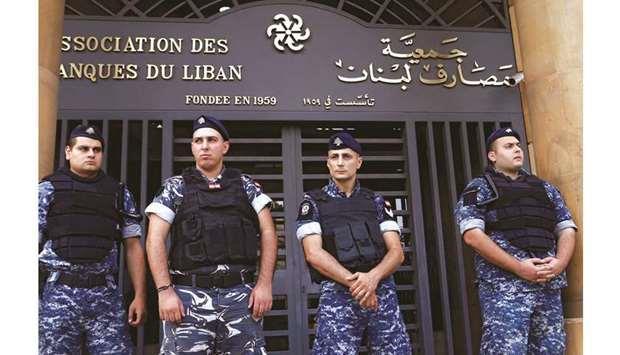
Lebanese banks curtail transfers abroad amid unrest
(MENAFN- Gulf Times) Lebanese banks have curtailed the transfer of dollar deposits abroad until political turbulence that has engulfed the country and raised fears of a collapse in its currency peg subsides.
Lebanon has not imposed official restrictions on the movement of money as lenders reopen their doors after two weeks of nationwide anti-government protests. But banks have independently moved to tighten informal limits already in place for months to avoid capital flight amid crumbling confidence.
Tellers working in four of Lebanon's major banks said transfers of deposits abroad had been stopped until further notice, regardless of the amount and destination. Some said they were making exceptions for clients who could prove they needed to pay for university fees, loans or healthcare abroad, for instance. The restrictions were confirmed by at least two senior bank officials, who declined to be named because of the sensitivity of the issue.
Banks have fielded calls from high net worth depositors asking to move their money abroad, but both bankers said big clients had been broadly understanding when told to wait until the political uncertainty eases.
'It's gone better than expected, one of the senior bankers added.
Capital controls are becoming the weapon of choice for embattled governments in need of breathing room, with Argentina tightening its restrictions after a left-leaning populist won the presidential elections.
Though Lebanon's restrictions are informal and temporary, some economists have warned they could discourage inflows from diaspora investors, the country's financial lifeline. But Lebanon, one of the world's most indebted nations, has few viable alternatives.
Hundreds of thousands of Lebanese have been on the streets for two weeks, demanding the resignation of a political class they say has pillaged state coffers to the verge of bankruptcy whilst leaving the public with failing services. The protests prompted the resignation this week of Prime Minister Saad Hariri. A replacement has yet to be named, raising concerns the country will be unable to implement measures needed to avert economic crisis.
Lebanon has already had to delay a planned Eurobond issuance of up to $3bn due to the unrest though the central bank still plans to repay debt maturing later this month. The worsening sentiment has played out in the markets. As Beirut stock exchange reopened for the first time in two weeks, shares in Lebanese real estate company Solidere, seen as a bellwether of political stability, tumbled the most in 11 years.
Yields on government bonds maturing in 2021 reached 39.4% on Thursday but eased to 35.6% as bank operations resumed and President Michel Aoun lent his support to the creation of a government of experts, as demanded by protesters.
'Despite the various challenges looming at the horizon, the formation of a credible technocrat government can still restore confidence and launch the required reassurance signals for markets, depositors and investors, said Marwan Barakat, chief economist at Lebanon's Bank Audi.
To keep its lenders stable and defend the dollar peg, Lebanon relies on inflows from millions of Lebanese living abroad. However, capital inflows needed to finance the large current account and fiscal deficits have slowed as confidence has dwindled. Meanwhile, outflows have gathered pace.
Importers have complained for months that banks were not allowing them to transfer Lebanese pound holdings into dollars to pay for shipments. Instead, businesses were increasingly turning to exchange bureaus, and paying more than the official rate of 1,507 pounds to the dollar.
For much of this year, some lenders have placed informal limits on dollar transfers and withdrawals. On Friday, lenders tightened restrictions on withdrawals of dollars and raised transaction fees to discourage people from taking out more cash than they need for their daily spending.
'The banks are monitoring the requirements and needs of citizens and are ready to take the necessary measures to ensure normal operations, Selim Sfeir, head of the Association of Banks in Lebanon, said in a statement.

Legal Disclaimer:
MENAFN provides the
information “as is” without warranty of any kind. We do not accept
any responsibility or liability for the accuracy, content, images,
videos, licenses, completeness, legality, or reliability of the information
contained in this article. If you have any complaints or copyright
issues related to this article, kindly contact the provider above.


















Comments
No comment